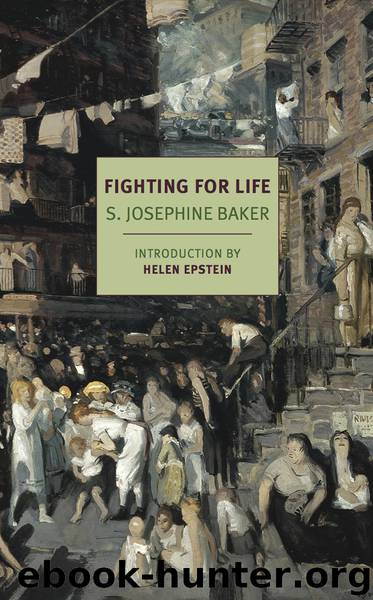Fighting for Life by S. Josephine Baker

Author:S. Josephine Baker
Language: eng
Format: epub
ISBN: 978-1-59017-707-5
Publisher: New York Review Books
Published: 2013-08-29T04:00:00+00:00
CHAPTER VII
BABY HEALTH STATIONS, AS WE CALLED THEM, were among the Bureau’s earlier achievements and, as I look back on our work, were the place at which we first dug deep into the problems we had wished on ourselves.
At this point elder readers must cast their minds back thirty years or so and remember that in that short interval the whole milk supply of New York, and nearly all other big cities, has been revolutionized. The pasteurizing process was already known, but the great bulk of milk consumed by the poorer people was “grocery,” or “loose” milk, unpasteurized, originating from all sorts and conditions of dairies, sold in dubious containers, and undoubtedly one of the most prolific sources of babies’ and children’s diseases. It came into New York City from six different states, all with different sanitary regulations and standards of enforcement, and was never less than twenty-four hours old when it entered the grocery store, to be dipped into for bulk sale. Under those circumstances telling a tenement mother to give her child so much milk a day was like telling her to give him a diluted germ-culture daily.
Then there was the other problem of how to get the tenement mother properly to modify cow’s milk for the human baby. No modern mother needs to be told that the differences in protein and butter-fat content and other details between cow’s and human milk are extremely important to the baby that drinks it. But that was new in our time too and had to be sold to the tenement mother, as only one of a number of things she must learn if she was not going to kill her baby even with the best intentions in the world.
In the baby health stations we were definitely building on the experience of others. France had developed private institutions called the Goutte de Lait and the Consultation des Nourissons which supplied milk for babies whose mothers had abandoned the idea of breast-feeding, making some attempt to teach modification, and in the United States, establishments generously subsidized by Nathan Straus and others were distributing modified and pasteurized milk free in some thirty large cities. (The Straus stations were gallant battlers in the cause of pasteurization and did a great deal to combat the public’s unhappy prejudice against “cooked” milk.) But I think we were the first to use milk-distribution as a way of coming into contact with mothers in order to educate them in scientific child care—always modified by common sense as the cow’s milk was modified for human babies’ consumption. We early developed the idea that, if we sold whole milk just enough below standard prices to tempt mothers to come to us, we could teach these mothers a great deal about baby care in the process of milk-buying. “Women and children first” was our natural motto, and since young babies are helpless by definition, it was the women we campaigned for, first, last and always.
So we decided to set up in all
Download
This site does not store any files on its server. We only index and link to content provided by other sites. Please contact the content providers to delete copyright contents if any and email us, we'll remove relevant links or contents immediately.
Hit Refresh by Satya Nadella(8346)
When Breath Becomes Air by Paul Kalanithi(7277)
The Girl Without a Voice by Casey Watson(7273)
Do No Harm Stories of Life, Death and Brain Surgery by Henry Marsh(6345)
A Court of Wings and Ruin by Sarah J. Maas(6122)
Hunger by Roxane Gay(4237)
Shoe Dog by Phil Knight(4186)
Everything Happens for a Reason by Kate Bowler(4076)
A Higher Loyalty: Truth, Lies, and Leadership by James Comey(4044)
The Rules Do Not Apply by Ariel Levy(3916)
Tuesdays with Morrie by Mitch Albom(3845)
The Immortal Life of Henrietta Lacks by Rebecca Skloot(3834)
How to Change Your Mind by Michael Pollan(3691)
Millionaire: The Philanderer, Gambler, and Duelist Who Invented Modern Finance by Janet Gleeson(3577)
All Creatures Great and Small by James Herriot(3529)
Elon Musk by Ashlee Vance(3463)
Tokyo Vice: An American Reporter on the Police Beat in Japan by Jake Adelstein(3448)
Man and His Symbols by Carl Gustav Jung(3331)
The Money Culture by Michael Lewis(3293)
